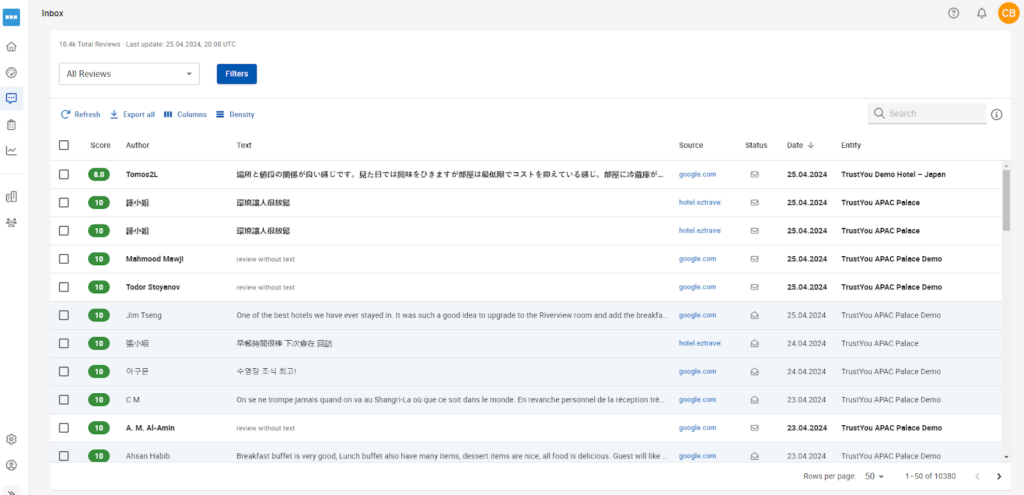Are your guests leaving fewer reviews than you expect? Here are 4 ways for hoteliers to get more feedback from guests.
Before making a buying decision, most of us are looking for opinions and recommendations from other consumers. Marketers refer to this type of communication as social proof or word-of-mouth communication. Social proof is among the most powerful ways to carry on traditions, tell the world’s stories, and share the things we love with friends and family. For a hotelier, word-of-mouth can bring a lot of advantages such as getting even more feedback from guests. Take advantage of free advertising that helps generate additional revenue in the process – sounds like a dream for every hotelier.
Why Is It So Important To Stop Dreaming And Actually Start Getting More Reviews?
Now you are probably wondering why getting more feedback from your guests has such great importance for your hotel. The importance of online reviews stems from a very simple idea: people trust the words of others more than the company itself. It’s not us telling you this, it’s the data. And data speaks for itself.
Did you know that one of the major steps in the booking process for 95% of travelers, according to a TrustYou study, is reading reviews?
Yes, you read that right: 95%, and frankly, that’s the majority of people.

Still not convinced why you should start to look more closely at ways to improve your online reputation and get more feedback from your guests? No worries, we have more data for you. After all, we have hospitality in our blood and we believe in the power of data.
People behave differently when it comes to researching online reviews about a certain accommodation. Even if a potential customer gets a recommendation for your business from a friend, they are still very likely to go online and look at reviews.
8.7
is the average number of reviews read by travelers before making a booking decision. Every author who leaves feedback typically reads 9.8 reviews. Those who only read reviews scan 7.5 reviews before booking a stay.
Today, more than ever, people research any service or future purchase online before making a decision because they can easily access information through many devices and channels.

Why Didn’t My Guest Leave a Review?
As you can see, in the age of the Internet, (the act of) leaving a review is literally at the tip of our fingertips. Knowing all this, you are probably wondering why your hotel guests don’t always give feedback after their stay.
Here are some of the possible reasons why they are not writings reviews:
It takes too much time and they don’t see the point in leaving a review.
Time is precious and it is no different when it comes to giving feedback. People value their time. That is why almost half of the review readers consider the efforts of leaving feedback too high. Not seeing any value in their evaluation is another reason why 16% of travelers are not giving their feedback after their stay.

You didn’t send them a survey/form and they don’t know where to leave a review.

35.1 % of review readers are not leaving reviews because they are not aware that there’s a survey or don’t know where to leave a review.
To receive reviews from your guests, you need to clearly ask them for feedback. The good news is that you can choose to send them a survey. Your guests receive many emails every day, so it is better if you tell guests why they are receiving a survey. This way, they are more likely to provide feedback. For example, you could let them know to expect your survey and tell them this: “After your stay, we will email you a short survey so that you can give us feedback about your visit. It should not take more than five minutes to fill out”.
Mandarin Oriental Hotel Group Doubles Its Survey Response Rate
The Mandarin Oriental Hotel Group has leveraged TrustYou’s Reputation Management Platform to optimize their unique and global guest experience since 2016. The partnership began with the Analytics Platform allowing Mandarin Oriental to understand guest feedback and take action to improve the guest experience.

They don’t want to think about travel when it’s over
We’re sure you’ve experienced that sacred time between ending vacation and getting back to your daily routine. Catching up with friends or simply putting your mind to that new project at work. As mentioned above, time is precious and people have things to do after their vacation comes to an end. That’s why guests are not leaving a review right away, and it’s likely they will forget about it.
Around 1 out of 4 readers don’t want to think about leaving a review when the travel is over.

You do not keep your promises
“Trust is the glue of life. It’s the most essential ingredient in effective communication. It’s the foundational principle that holds all relationships.”
Stephen Covey
It takes time to gain the trust of others, especially when it comes to gaining the trust of your guests. Imagine this: someone is making a complaint that the sheets are not clean and they need to be changed immediately. This request gets to your staff, they say they will change them as soon as possible, but they forget about it. This is the perfect recipe to get your guests angry and confused because you are not aware of the reason behind their attitude. As mentioned before, emotion is something that can not be neglected. It is the strongest driver of customer retention. An easy way to help you in the journey of keeping your promises is to implement the latest technologies for the hospitality industry.
How Do You Get More Feedback from Your Guests?
Consider offering incentives
Creativity plays a crucial role in every business, so if you are not prioritizing this already, well, this is your sign to do it. Hospitality is a deeply personal industry and showing an interest in delivering the best experience is always seen as a sign of quality and respect. Paying attention to the small details could get you to sensibilize your guests and touch them on an emotional level. If your budget allows for it, you can get creative and offer exciting incentives to guests that end up submitting feedback. You do not have to go out of your way to implement this. Think of a perk that will not break the bank, something like a free dinner, cocktail, or a one-day spa pass. Other motivating incentives are found in one of TrustYou’s recent studies. It is a nice and fun way to remind them how important feedback is to your business.

More than 6 out of 10 guests that don’t leave a review are more likely to give feedback if they receive a room upgrade or if the hotel is offering them a discount on their next stay.
Use more advertising to promote your hotel
It is 2022 and we are all on social media, from our friends and family members to our favorite hotels, shops, or tech companies. Whether you already have a marketing strategy implemented or not, advertising is something that you cannot ignore. Making good use of these channels along with a strong marketing campaign can increase your visibility, allow you to shine, and most important: you can get more feedback from your guests. Therefore, the marketing and advertising methods you choose can determine the performance of your hotel. In order to have a success story that writes itself, we suggest identifying your target audience and reaching out to them with a catchy and influential message.
Another great way to advertise your hotel is to reach out to popular travel influencers and invite them to stay at your hotel in exchange for some social media posts and mentions. To avoid sounding unnatural or controlled, it is best to allow the influencers the freedom to use their own words instead of having a script prepared for them in advance.
Give a clear path to where your guest can leave a review
One efficient way to get more feedback from your guests is to guide them to where and how you would like to receive the review. Make sure that you have your homework done and know about which are their preferred channels of communication. Although there are many options to share your surveys with your guests, the good old email is still a thing, and it’s seen by 63.7% of guests that complete surveys as the best way to receive a survey.

Make it valuable
If it’s valuable for you, it’s valuable for them! Whether you tell them verbally or through the power of technology make sure that you show your guests that their opinion matters to you.
43% of guests that don’t leave reviews are more inclined to give feedback if a hotel takes every review seriously, not only by reading it but actually responding to it.

Ongoing Feedback vs Repeat Reviews
The Importance of an Ongoing Feedback Journey
Creating an ongoing feedback journey is a proactive approach that will allow you to prevent negative reviews and address potential issues before, during, and after your guests’ stay. By engaging with guests at various touchpoints, you can gain insights into their preferences, expectations, and concerns, ultimately enhancing the overall experience. Here are a few ideas on how to ensure a continuous cycle of feedback:
# 1 Pre-Stay Feedback: Understand Expectations
The feedback journey should start way before your guests even set foot on the property. Ask your guests about their expectations and preferences. You can use pre-stay surveys or questionnaires sent during the booking confirmation process or a few days before arrival. By understanding your guests’ needs and preferences in advance, you can tailor the experience to better align with individual expectations, reducing the likelihood of negative feedback based on unmet expectations.
#2 On-Site Feedback: Address Issues
During your guests’ stay, hotels can actively seek feedback through various touchpoints, such as in-person interactions with staff, in-room surveys, or digital feedback kiosks. Encouraging guests to provide real-time feedback will allow you to address any issues promptly, demonstrating a commitment to satisfaction and potentially averting negative post-stay reviews. Proactively seeking input while guests are on-site also creates opportunities to enhance their experience in real-time, leading to a more positive overall impression.
#3 Post-Stay Feedback: Recognize & Improve
After your guests’ departure, continue the feedback journey: request post-stay feedback through email surveys, or personalized communication. This provides an opportunity for guests to reflect on their experience and share any additional feedback or suggestions. By actively seeking post-stay reviews, hotels can uncover valuable insights that may have gone unnoticed during the guest’s stay, allowing for further improvement and the potential mitigation of negative feedback.
#4 Leverage an Integrated Approach
Implementing an integrated approach including these three stages empowers hotels to address potential issues and proactively deliver personalized guest experiences. If you’re using multiple touchpoints to interact with your guests, make sure that these are customized and relevant for each stage. If you’re using surveys, make them as short and specific as possible, to get useful feedback that can help you improve your services. Train your staff to proactively listen and act based on their direct interaction with the guests – this will add an extra layer of attention and care.
In summary, creating an ongoing feedback journey is a strategic approach that enables hotels to address concerns preemptively, align with guest expectations, and consistently deliver exceptional experiences. Embracing feedback as a continuous dialogue throughout the guest’s journey not only mitigates the potential for negative feedback but also cultivates a guest-centric approach that drives long-term success and loyalty.
Best Practices to Prevent Repeat Reviews
There are cases when more reviews can harm your reputation. Sometimes, your guests can use different accounts or platforms to leave multiple reviews for a single stay. Not only does this hurt your credibility, but it can also harm your overall reputation.
To prevent repeat reviews and ensure the accuracy of guest feedback, implement the following best practices:
1. Monitor Your Reviews Regularly
Ensure that your staff is checking periodically, depending on your review volume, all the sources where guests can leave their feedback. In this way, you can quickly identify suspicious activity and keep an eye on the issues flagged in the reviews. If you identify multiple reviews that you suspect are coming from the same person, make sure to flag or remove them, depending on the platform’s policy.
2. Provide Timely and Effective Resolution
Address guest complaints and issues promptly during their stay to prevent negative feedback. When guests feel their concerns are acknowledged and promptly resolved, they are less likely to feel compelled to leave multiple reviews. Empower your staff with the authority and resources to resolve problems on-site, demonstrating your commitment to guest satisfaction.
3. Encourage Direct Communication Channels
Promote direct communication between guests and management to address any concerns or issues they may have during their stay. Provide clear and accessible feedback channels such as email or phone, allowing guests to express their feedback directly to management. By facilitating direct communication, you can address any concerns in real-time and respond effectively, ultimately reducing the need for repeat reviews.
4. Personalize the Guest Experience
Focus on personalized service to meet individual guest needs and create memorable experiences. When guests feel valued and attended to during their stay, they are more likely to have a positive perception of your property and less inclined to leave multiple reviews. By going the extra mile to provide personalized service, you can enhance guest satisfaction and minimize the likelihood of repeat reviews.
5. Use Technology to Track and Identify Repeat Reviews
Implement a robust guest feedback management system that tracks and identifies repeat reviews from the same guest. Utilize technology tools that can help you identify patterns and flag potential duplicate reviews. Automation and data analysis can support your efforts in managing feedback effectively, ensuring that you can detect and handle repeat reviews promptly.

Feedback is the ultimate way to measure and improve your guest satisfaction. By understanding its power and potential, you can take your guest experience to the next level. By implementing these strategies and actively seeking guest feedback, hoteliers can improve their online reputation, attract more potential guests, and ultimately enhance the overall guest experience.
Feel free to get in touch with our team of experts for a free consultation or if you have any questions!